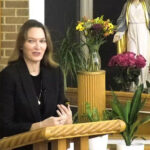When diocesan volunteer Loxi Hopkins hears the voice of a woman or man on the other end of the phone at the Project Rachel Helpline, she hears pain. It may be the first time a caller has talked about the abortion since it happened and the caller’s voice shakes. “I pray to God to give me the words and the love to hear their pain and to let them know God loves and forgives. I can hear relief in their voices when they know there are priests, counselors and volunteers who can assist them in unburdening themselves.”
The Catholic Church teaches that abortion is a grave sin. But a person who has obtained an abortion and truly seeks forgiveness can do so through the sacrament of reconciliation. All priests can absolve a person for the sin of abortion. The Holy Father is describing something, a bit different, namely the excommunication that can arise from this act.
Theologian German Martinez observes that in the sacrament of reconciliation the church has “a great potential for its own spiritual reform…. The sacrament is likewise a lifetime process of the believer’s transformation to the ways of Christ.”
Press accounts of a statement Pope Francis made Sept. 1 about absolution for abortion gave the impression of a previously daunting process for the person desiring forgiveness. The media missed an important point: the Holy Father didn’t announce new teaching in the Catholic Church. He extended absolution for abortion to every priest in the world who did not have the ability to lift the penalty of excommunication. To incur excommunication, a person had to have been aware of the penalty, be at least 17 years old and acted freely when obtaining an abortion. In other words, the church takes a merciful approach toward persons whose distress or ignorance prevented them from protecting an innocent life. Even individuals who made such a choice, with full knowledge of the penalty, can be forgiven. Christ, after all, died so that our sins could be forgiven. None of us is sin-free.
Many of us, however, have a tendency to be judgmental. Perhaps that’s why Pope Francis made his message public, even though the “rule” he invoked applies to a limited audience in the universal church. He’s calling all of us to imitate Christ’s generous gift of mercy, which the Holy Father describes as a wellspring of joy, serenity and peace. Mercy is a hallmark of his papacy and the subject of the Extraordinary Jubilee of Mercy which begins Dec. 8.
Approximately one in four women in the U.S. ages 15 and older obtains an abortion, according to the Hope After Abortion website (www.hopeafterabortion.com). It may take years for a woman to come to terms with what she has done to her unborn child and to herself. While we can never dismiss the sin of deliberately ending an unborn child’s life, we cannot condemn the woman who obtained an abortion. Let us instead reach out in compassion and encourage her to seek counseling and to receive the sacrament of reconciliation.
Remember, this is a pope whose discernment of a calling to the priesthood began as a 17-year-old receiving the sacrament of reconciliation. Reflecting on women who have resorted to abortion, Pope Francis says, “I have met so many women who bear in their heart the scar of this agonizing and painful decision. What has happened is profoundly unjust; yet only understanding the truth of it can enable one not to lose hope. The forgiveness of God cannot be denied to one who has repented, especially when that person approaches the Sacrament of Confession with a sincere heart in order to obtain reconciliation with the Father.”
Learn more about how abortion impacts people’s lives by visiting the Hope After Abortion website; provide people impacted by abortion with resources such as the Davenport Diocese’s Project Rachel Helpline (563-333-4107), the national helpline (1-888-456-HOPE) or the website: http://tinyurl.com/q76bdoq
Let us all be an example of Christ’s mercy in our daily lives.
Barb Arland-Fye











